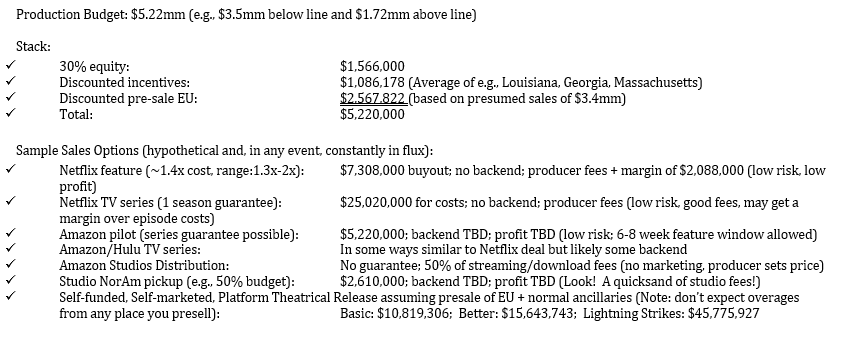Entertainment Before Yesterday (Part 4)
This post is a continuation of Parts 1, 2, and 3.
It takes real determination to set out into today’s new world of film/TV finance and get a project made. US Summer 2017 theater admissions dropped 18% over Summer 2016, the 2017 Labor Day frame posted the lowest box office numbers in 17 years (Entertainment Weekly, September 2017), and Netflix just added 5.3 million subscribers. The tsunami of change continues, and it’s more important than ever to stay up to the minute.
To help you plan a new campaign, let’s look at a few numbers. But first, let’s review the usual checklist:
- Are you making your project for film or TV? In some ways, the answer to this fundamental question matters less now because it tends to be less about story and more about how the project is distributed to audiences. The good news is that an interesting script today could pass as a $5MM indie film or a $5MM TV pilot – I mean, you’re pretty much making the same movie either way, right? A TV production will have to feel episodic (Check); foreshadow ongoing storylines, subplots, and continuing characters (Check); and end with a cliff-hanger (Check). But since film has become so driven by sequels and franchises, you may have the same story issues for a film production. So… make it for film or TV? In reality, you may not know yet, it could be either, and Amazon or Netflix or Disney may make the decision for you.
- Above-line team in place (other than principal cast, which you will need equity-holding money for)? Check.
- Key crew in place? This is usually defined as line producer-UPM, first AD, composer, editor, DP, and production designer. In a way, “the more the merrier” applies, but, other than line producer-UPM, you don’t really need a crew yet. So we’ll give this a Future Check.
- Budget and top sheet in place? Done by the line producer-UPM. Check.
- Foreign sales agent in place? Really important, but can’t move without principal cast, so Future Check.
- Below-line team? Don’t need them until prep, so Future Check.
- Equity investors in place? The hardest check to check, but you need them to book the main actors or the agents won’t talk to you.
- Debt concept in place for non-equity soft money? You need the foreign sales agent to work his or her magic plus a discount facility for incentive payments, but you won’t qualify for most/all incentives without full funding and a national distributor committed. Catch 22 Check.
- Distributor/exhibitor in place? Would be nice, but this is an easier check to check once you know whether you can make the project without using any of a distributor’s or exhibitor’s money. The distribution/exhibition deal can get a lot better if you’re self-funded. Another Future Check.
- Completion bond in place? Equity and debt won’t cash flow without it, but the completion bond comes at the very end, so we’ll make this a Future Check.
- Marketing money in place? Depends on the first item on the list, but since it can usually be last money in, first money out, you think you’ll land it. So this is a Future Check.
- Reality check? Not applicable – this is entertainment.
On to some sample numbers: For the sake of example (and numbers that sort of add up), let’s say:
Hmm, that’s a lot of options. What to do? What to do? As we see from the above hypotheticals, there’s a tremendous range of potential profitability and potential risk. So do you try for the low-profit but very safe Netflix buyout? The white-knuckle feature distribution ride (with huge collection and cash flow issues and delays)? Or something in between? At the end of the day, the decision may be based on the risk tolerance and liquidity demands of your equity investors, or on necessity, or on blind luck.
Conclusion: I was standing on a street corner once, conversing with two movie producers, when a person (who I think was John Milius, at least he looked like John Milius) stepped up and said: “Ah, Film? Oft announced but seldom made.” There’s some truth to that. So whatever direction you pick, a moving-forward direction is the best solution.
Next time, we’ll talk about film incentives.


